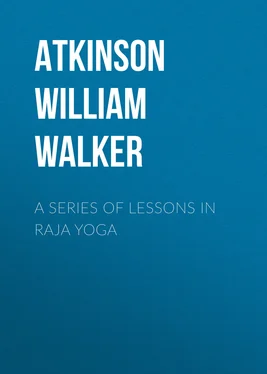William Atkinson - A Series of Lessons in Raja Yoga
Здесь есть возможность читать онлайн «William Atkinson - A Series of Lessons in Raja Yoga» — ознакомительный отрывок электронной книги совершенно бесплатно, а после прочтения отрывка купить полную версию. В некоторых случаях можно слушать аудио, скачать через торрент в формате fb2 и присутствует краткое содержание. Жанр: foreign_prose, foreign_religion, Философия, foreign_psychology, foreign_antique, на английском языке. Описание произведения, (предисловие) а так же отзывы посетителей доступны на портале библиотеки ЛибКат.
- Название:A Series of Lessons in Raja Yoga
- Автор:
- Жанр:
- Год:неизвестен
- ISBN:нет данных
- Рейтинг книги:3 / 5. Голосов: 1
-
Избранное:Добавить в избранное
- Отзывы:
-
Ваша оценка:
- 60
- 1
- 2
- 3
- 4
- 5
A Series of Lessons in Raja Yoga: краткое содержание, описание и аннотация
Предлагаем к чтению аннотацию, описание, краткое содержание или предисловие (зависит от того, что написал сам автор книги «A Series of Lessons in Raja Yoga»). Если вы не нашли необходимую информацию о книге — напишите в комментариях, мы постараемся отыскать её.
A Series of Lessons in Raja Yoga — читать онлайн ознакомительный отрывок
Ниже представлен текст книги, разбитый по страницам. Система сохранения места последней прочитанной страницы, позволяет с удобством читать онлайн бесплатно книгу «A Series of Lessons in Raja Yoga», без необходимости каждый раз заново искать на чём Вы остановились. Поставьте закладку, и сможете в любой момент перейти на страницу, на которой закончили чтение.
Интервал:
Закладка:
"Yet the weary and careworn faces that we meet by thousands, even among the affluent classes of civilization, testify only too clearly how seldom this mastery is obtained. How rare indeed to meet a man ! How common rather to discover a creature hounded on by tyrant thoughts (or cares or desires), cowering, wincing under the lash—or perchance priding himself to run merrily in obedience to a driver that rattles the reins and persuades him that he is free—whom we cannot converse with in careless tete-a-tete because that alien presence is always there, on the watch.
"It is one of the most prominent doctrines of Raja Yoga that the power of expelling thoughts, or if need be, killing them dead on the spot, must be attained. Naturally the art requires practice, but like other arts, when once acquired there is no mystery or difficulty about it. And it is worth practice. It may indeed fairly be said that life only begins when this art has been acquired. For obviously when instead of being ruled by individual thoughts, the whole flock of them in their immense multitude and variety and capacity is ours to direct and dispatch and employ where we list ('for He maketh the winds his messengers and the flaming fire His minister'), life becomes a thing so vast and grand compared with what it was before, that its former condition may well appear almost antenatal.
"If you can kill a thought dead, for the time being, you can do anything else with it that you please. And therefore it is that this power is so valuable. And it not only frees a man from mental torment (which is nine-tenths at least of the torment of life), but it gives him a concentrated power of handling mental work absolutely unknown to him before. The two things are co-relative to each other. As already said this is one of the principles of Raja Yoga.
"While at work your thought is to be absolutely concentrated in it, undistracted by anything whatever irrelevant to the matter in hand—pounding away like a great engine, with giant power and perfect economy—no wear and tear of friction, or dislocation of parts owing to the working of different forces at the same time. Then when the work is finished, if there is no more occasion for the use of the machine, it must stop equally, absolutely—stop entirely—no worrying (as if a parcel of boys were allowed to play their devilments with a locomotive as soon as it was in the shed)—and the man must retire into that region of his consciousness where his true self dwells.
"I say the power of the thought-machine itself is enormously increased by this faculty of letting it alone on the one hand, and of using it singly and with concentration on the other. It becomes a true tool, which a master-workman lays down when done with, but which only a bungler carries about with him all the time to show that he is the possessor of it."
We ask the students to read carefully the above quotations from Mr. Carpenter's book, for they are full of suggestions that may be taken up to advantage by those who are emancipating themselves from their slavery to the unmastered mind, and who are now bringing the mind under control of the Ego, by means of the Will.
Our next lesson will take up the subject of the relationship of the "I" to the Universal "I," and will be called the "Expansion of the Self." It will deal with the subject, not from a theoretical standpoint, but from the position of the teacher who is endeavoring to make his students actually aware in their consciousness of the truth of the proposition. In this course we are not trying to make our students past-masters of theory , but are endeavoring to place them in a position whereby they may know for themselves, and actually experience the things of which we teach.
Therefore we urge upon you not to merely rest content with reading this lesson, but, instead, to study and meditate upon the teachings mentioned under the head of "Mental Drill," until the distinctions stand out clearly in your mind, and until you not only believe them to be true, but actually are conscious of the "I" and its Mental Tools. Have patience and perseverance. The task may be difficult, but the reward is great. To become conscious of the greatness, majesty, strength and power of your real being is worth years of hard study. Do you not think so? Then study and practice hopefully, diligently and earnestly.
Peace be with you.
MANTRAMS (AFFIRMATIONS) FOR THE SECOND LESSON
"I" am an entity—my mind is my instrument of expression.
"I" exist independent of my mind, and am not dependent upon it for existence or being.
"I" am Master of my mind, not its slave.
"I" can set aside my sensations, emotions, passions, desires, intellectual faculties, and all the rest of my mental collection of tools, as "not I" things—and still there remains something—and that something is "I," which cannot be set aside by me, for it is my very self; my only self; my real self—"I." That which remains after all that may be set aside is set aside is the "I"—Myself—eternal, constant, unchangeable.
THE THIRD LESSON.
THE EXPANSION OF THE SELF
In the first two lessons of this course we have endeavored to bring to the candidate a realization in consciousness of the reality of the "I," and to enable him to distinguish between the Self and its sheaths, physical and mental. In the present lesson we will call his attention to the relationship of the "I" to the Universal "I," and will endeavor to give him an idea of a greater, grander Self, transcending personality and the little self that we are so apt to regard as the "I."
The keynote of this lesson will be "The Oneness of All," and all of its teachings will be directed to awakening a realization in consciousness of that great truth. But we wish to impress upon the mind of the Candidate that we are not teaching him that he is the Absolute. We are not teaching the "I Am God" belief, which we consider to be erroneous and misleading, and a perversion of the original Yogi teachings. This false teaching has taken possession of many of the Hindu teachers and people, and with its accompanying teaching of "Maya" or the complete illusion or non-existence of the Universe, has reduced millions of people to a passive, negative mental condition which undoubtedly is retarding their progress. Not only in India is this true, but the same facts may be observed among the pupils of the Western teachers who have embraced this negative side of the Oriental Philosophy. Such people confound the "Absolute" and "Relative" aspects of the One, and, being unable to reconcile the facts of Life and the Universe with their theories of "I Am God," they are driven to the desperate expedient of boldly denying the Universe, and declaring it to be all "an illusion" or "Maya."
You will have no trouble in distinguishing the pupils of the teachers holding this view. They will be found to exhibit the most negative mental condition—a natural result of absorbing the constant suggestion of "nothingness"—the gospel of negation. In marked contrast to the mental condition of the students, however, will be observed the mental attitude of the teachers, who are almost uniformly examples of vital, positive, mental force, capable of hurling their teaching into the minds of the pupils—of driving in their statements by the force of an awakened Will. The teacher, as a rule, has awakened to a sense of the "I" consciousness, and really develops the same by his "I Am God" attitude, because by holding this mental attitude he is enabled to throw off the influence of the sheaths of the lower mental principles, and the light of the Self shows forth fiercely and strongly, sometimes to such an extent that it fairly scorches the mentality of the less advanced pupil. But, notwithstanding this awakened "I" consciousness, the teacher is handicapped by his intellectual misconception and befogging metaphysics, and is unable to impart the "I" consciousness to his pupils, and, instead of raising them up to shine with equal splendor with himself, he really forces them into a shadow by reason of his teachings.
Читать дальшеИнтервал:
Закладка:
Похожие книги на «A Series of Lessons in Raja Yoga»
Представляем Вашему вниманию похожие книги на «A Series of Lessons in Raja Yoga» списком для выбора. Мы отобрали схожую по названию и смыслу литературу в надежде предоставить читателям больше вариантов отыскать новые, интересные, ещё непрочитанные произведения.
Обсуждение, отзывы о книге «A Series of Lessons in Raja Yoga» и просто собственные мнения читателей. Оставьте ваши комментарии, напишите, что Вы думаете о произведении, его смысле или главных героях. Укажите что конкретно понравилось, а что нет, и почему Вы так считаете.












